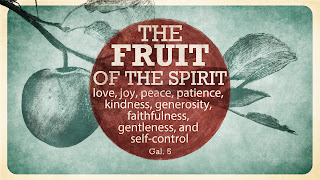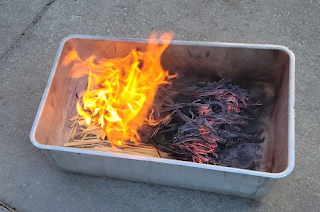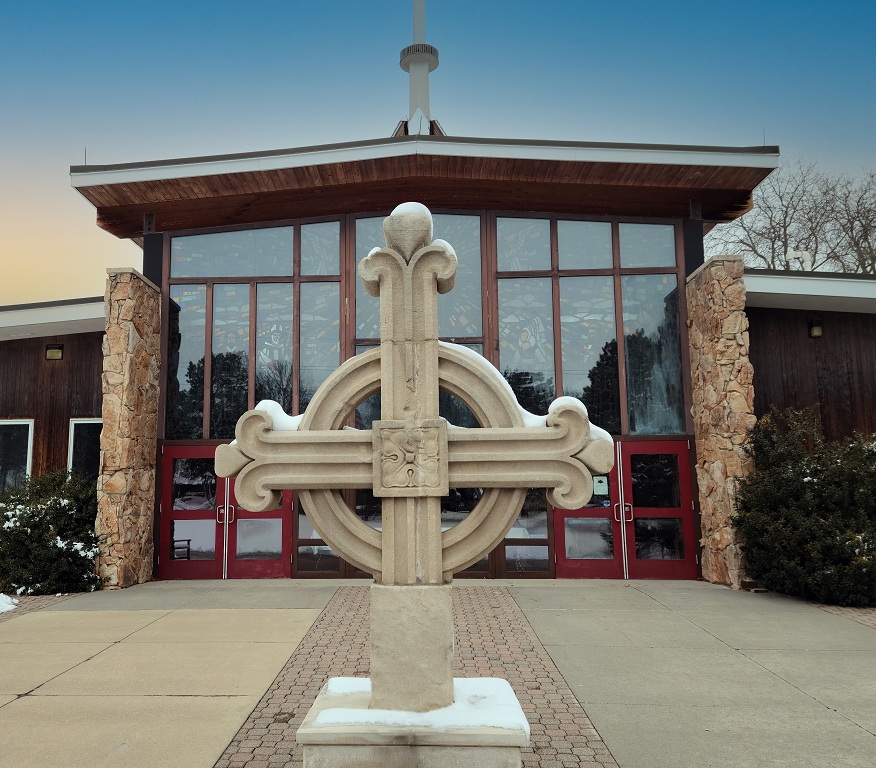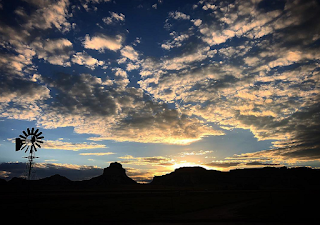“We hold these
truths to be self-evident, that all men [all people] are created equal, that
they are endowed by their Creator with certain unalienable Rights, that among
these are Life, Liberty and the pursuit of Happiness. That to secure these rights,
Governments are instituted among Men, deriving their just powers from the
consent of the governed...” The Declaration of Independence…you’ve all seen a
reproduction of it, right? Remember the giant signature at the bottom, John
Hancock’s? Legend has it that he wrote it bigger than anyone else’s so that
King George could see it without his reading glasses. Paul does the same thing
in today’s reading; he says: “See what large letters I make when I am writing
in my own hand!” Paul wants his readers to know that what he’s saying was so
important that he isn’t doing the typical practice of having someone transcribe
his words on paper for him—he’s writing it down himself, and in really big
letters!
This reading is
from the end of Paul’s letter to the Galatians, which he is writing to summarize
and reiterate the Gospel Good News, because some in Galatia are claiming that his
teaching is false. Paul’s key points are a perfect summary of the Gospel for
us, too: We are justified not by the works
of the law but through faith in
Jesus Christ (2:15). There is no longer Jew or Greek, there is no longer slave
or free, there is no longer male and female; for all are one in Christ Jesus
(3:28). We are called to freedom, not to use our freedom as an opportunity for
self-indulgence, but through love to become slaves to one another. For the
whole law is summed up in a single commandment, "You shall love your
neighbor as yourself” (5:13-14). The fruit of the Spirit is love, joy, peace,
patience, kindness, generosity, faithfulness, gentleness, and self-control (5:22b-23a).
Bear one another's burdens, and in this way you will fulfill the law of Christ
(6:2) And finally, Let us not grow weary in doing what is right…Whenever we
have an opportunity, let us work for the good of all (6:9a, 10a).
All are one…Work
for the good of all…Paul loves the word “all.” The opposite of “all” is “us”
and “them,” and it has produced some of history’s most horrific tragedies. Paul
says there is a better way: the way of Jesus that offers compassion to all as
beloved children of God deserving love, care, acceptance, dignity, freedom,
security, and fullness of life. Today, Paul would say, “There is no longer
Muslim-Christian, liberal-conservative, straight-gay-bi, female-male,
republican-democrat, immigrant-citizen…” “Dear Galatians…Dear Nebraskans,”,
Paul says in today’s reading, “we must have compassion for the other, do what
is helpful, never tire of doing what is right, and always work for the good of
all.
In an email this
week, the Bishop of East Tennessee said, “We live in a time of
great debate regarding our immigration laws and policies. People of goodwill
can disagree about law and policy.” We are not talking about laws and policies.
“However, as baptized Christians and as citizens of this country, I believe we
are called to hold ourselves to [the baptismal promises] we have made regarding
human dignity for all and care for neighbor and stranger. In particular, how we
treat children is telling about what kind of people and Christians and citizens
we hope and plan to be. Separation of families and inhumane treatment of
children in our government’s custody falls far short of our baptismal promises
and our country’s ideals. As Episcopalians, we hold ourselves to safeguarding
God’s children in our care… The care being offered to the children in our
government’s custody along the southern U.S. border falls far short of what we
would expect for ourselves in caring for children, the least of these in our
midst.”
It is a symptom
of our divided times that this might sound to you like liberal, snowflake
propaganda. Let me assure that it’s not. Just listen to the Independence Day Bible
lectionary selections from the prayer book—not our current prayer book, but the
one from 100 years ago, the first one that had specific readings designated for
July 4th—the Book of Common Prayer 1928.
- Deuteronomy
10: “The Lord your God…executes justice for the orphan and the widow, and loves
the strangers, providing them food and clothing. You shall also love the
stranger, for you were strangers in the land of Egypt.”
- Psalm 145: The
Lord is loving to everyone and his compassion is over all his works…The Lord
upholds all those who fall; he lifts up those who are bowed down.
- Hebrews 11: By
faith Abraham obeyed when he was called to set out for a place that he was to
receive as an inheritance; and he set out, not knowing where he was going.
- Matthew 5: I
say to you, Love your enemies and pray for those who persecute you, so that you
may be children of your Father in heaven.
This is not a
new, radical, liberal message—This is the Gospel message…This is the Good News
of Jesus we share and preach to the world. We are citizens of the United States,
but we must also remember that, as Paul says in his letter to the Philippians
(3:20), we are first and foremost citizens of heaven. Both of these
loyalties lay a claim for freedom, liberty, and peace. If we are to be true
citizens of both, we must be mature and humble enough to look at where we have
fallen, and are falling, short of our high calling and stated ideals. Right
now, as borders are walled and immigrant children are kept in unsanitary cages,
as politicians work to deconstruct institutions and policies established
throughout our history to protect and affirm and liberate, the church—we
followers of Jesus—must never tire of proclaiming and living this message that
all are one. “Let us not grow weary in doing what is right…let us work for the
good of all.” Fox Business news reports that this past week we spent 1 billion
dollars on fireworks and 1.6 billion dollars on alcohol. If we are unable to
provide basic medical care and sanitation to immigrants at our borders, it’s
not because we can’t easily afford to care for them, it’s because we don’t
want to care for them—it’s because we just don’t care. If we have now
separated more than 2,300 young children there, and isolated them from their
families, and given them living conditions worse than our local animal
shelters, it is because we are too cruel…it is because the hundreds of millions
of us who call ourselves Christians in this country have not cried out in anger
and frustration to our representatives and demanded that we do what is right.
Twice
today Jesus tells the seventy to proclaim that the Kingdom of God has come
near. Paul believes that the inbreaking of God’s kingdom—here on earth as it is
in heaven—is at hand. Twice today Paul uses the word kairos, meaning “the
appropriate time” and “the decisive point in time,” to describe the present
time. Now is the opportune time for Jesus’ followers to do what
is right for the welfare of others (v. 9); now is the fitting
moment for accomplishing works of love (v. 10; see also Rom. 13:11).God’s people are
called to be a blessing to others. Each of us, every time there is a baptism,
makes a promise to love our neighbor as ourselves, to strive for justice and
peace among all people, and to respect the dignity of every human being. Our
neighbors: refugees, children, elderly, weak, poor,
imprisoned, hopeless, infirm and ill, are crying out to us. This is our
Kairos, our now, our decisive time, to live out our
baptismal promise and the ideals of freedom, equality, and peace for all that
we honored this July 4th.
Paul warns the
Galatians and he warns us: “Do not be deceived; God is not mocked, for you reap
whatever you sow.” My friends, our cheeks should be burning with shame, and our
eyes should be filled with tears for the pain and suffering sown by our hands. Foretastes
of eternal, abundant life are possible, and the day is coming
when the hope of righteousness will be fulfilled for those who are known by the
fruits of the Spirit, for those who are known for their love, joy, peace,
patience, kindness, goodness, gentleness, and self-control, for those who love their
neighbors as themselves. The harvest is plentiful but the laborers are few.
Jesus sent out the seventy, and they returned with joy, rejoicing in God’s
power to heal the world and set it right. We have that same mission, as Jesus
sends us out of this building today. It won’t be easy, and Jesus warns us we
are sent like lambs in the midst of wolves—But my prayer for us all is that we will
accept our mission this day, and be sent, and that we will go forth into the
world, and return, rejoicing in the power of the Spirit.




Comments
Post a Comment